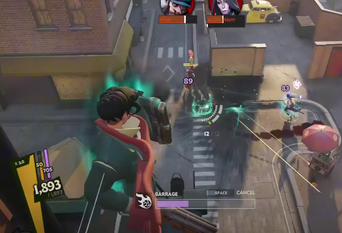Mechanics

“Let's get started, shall we?”
This article is a stub. You can help the Deadlock Wiki by expanding it.
Mechanics in Deadlock are a combination of third-person-shooter and MOBA mechanics. Broadly speaking, the macro mechanics are akin to a MOBA, whereas micros are that of a TPS.


Overview
Macros
- Laning
- The process of organizing players in the laning phase (see: "Strategy").
- Team Composition
- The process of choosing which heroes to play.
- Item Management
- The process of forming an item build.
Micros
- Uptime
- Uptime relates to farm camps (either Troops or Neutrals), to advancing lanes, to harassing enemies, to taking down towers etc. Everything that doesn't make you idle and generate value could be considered Uptime;
- Space
- Creating space will define which areas are controlled by your team, which Neutral camps are safe to farm, the length of your Zipline, the vision you have on your map etc. This concept is really broad, but what is important to understand is using Space in your favor and deny any enemy advance of Space;
- On Laning phase, this concept is even more important, since Space will define how far your Troops advance, it will impact ultimately on your last hits/denies and hero killing opportunities;
- Line of Sight
- Famous LoS of shooters, meaning the ability of the enemy to target you in his/her screen;
- Being in LoS of the enemy is dangerous in many situations and will create kill opportunity for the enemy team. This can be denied by using Corners and Walls (in most of cases);
- Cover Usage
- Like any shooter, using corners and walls allows you to be covered against almost all skills and items, since most of them require Line of Sight to be activated our cause damage. In other words, corners and wall usage can be translated as unbreakable shields for both Weapon and Spirit protection;
- Target Prioritization
- This concept is situational and depends on different factors. The main idea here is to focus your fire on the most important part of the fight. Some examples:
- The hero with the most number of Souls is a priority target, since he/she can turn the table in team fights and the reward for killing this hero will be greater;
- Heroes with disruptive ults - like Dynamo's, Pocket's etc - should be a primary target to either prevent the usage of these abilities or to force them to use in a not-optimal situation for the enemy;
- Heroes with low HP, since allowing them to live will prevent your team to get souls and will allow the enemy to have uptime;
- This concept is situational and depends on different factors. The main idea here is to focus your fire on the most important part of the fight. Some examples:
- Distance Management
- Understanding heroes (and abilities) which work in short range vs long range is key. Some examples:
- Pocket's shotgun will do huge damage from short range, while almost zero damage from mid/long range;
- Vindicta's ult can target long range target without significant damage fall off. Same happens with Grey Talon's first ability;
- Understanding heroes (and abilities) which work in short range vs long range is key. Some examples:
- Aiming
- Some heroes require more accuracy and skill expression regarding aiming - such as Vindicta -, but overall aiming is a crucial part of Deadlock.
- Cooldown Management
- Ideally, skill and item usage should be maximized, since they bring a big advantage in gaining souls and gaining Space. At the same time, cooldowns are your way to create space, to secure kills and escape from dying. So, Cooldown management is key to finding a balance between soul farming usage and enemy hero usage;
- Map Knowledge
- Crucial for many aspects in the game. Learning veil locations, Rune locations, Teleport locations, which buildings can be camped from rooftop etc., is a huge advantage for farming, securing kills, escaping, pursing enemies and so many other aspects of Deadlock.
- Rotations
- Can be defined as the creation of opportunities by surprising the enemy. A terminology from Dota calls Gank the art of appearing from a fog of a jungle to surprise - and potentially kill - enemies, but rotations are broader than that and can be related to creating space in different lanes and other related concepts;
- Movement
- Troop Management
Creep/troop denial is a crucial part of the game's laning phase and involves shooting the souls of one's own trooper when they are killed. This prevents enemy laners from obtaining soul orbs by killing troopers.